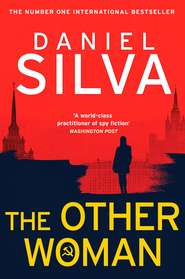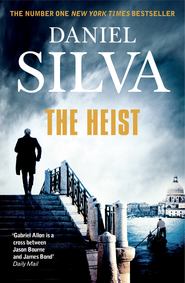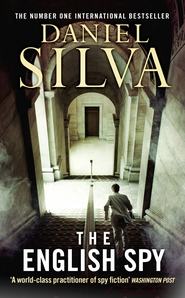По всем вопросам обращайтесь на: info@litportal.ru
(©) 2003-2024.
✖
Daniel Silva 2-Book Thriller Collection: Portrait of a Spy, The Fallen Angel
Настройки чтения
Размер шрифта
Высота строк
Поля
Nadia made no response. Gabriel pressed forward.
“We know what Mr. Qahtani told you because he gave the same briefing to us for the very reasonable price of one hundred thousand American dollars, deposited into a numbered Swiss bank account.” Gabriel permitted himself a brief smile. “Mr. Qahtani is a man with impeccable sources but suspect loyalties. He also has a fondness for beautiful women of the professional variety.”
“Was the information accurate?”
“Which part?”
“The part about the Israeli secret service murdering my father with the blessing of the CIA and the American president.”
Gabriel glanced at Zoe, who was doing an admirable job of concealing her curiosity. Now that her assignment was complete, she should have been quietly shown the door. But Gabriel had decided to allow her to remain in the room for now. His motives were purely selfish. He was acutely aware of the bond that had formed between his target and his agent of introduction. He was aware, too, that Zoe could be a powerful asset in helping to close the final deal. By her very presence, Zoe conferred legitimacy onto Gabriel’s cause and nobility onto his intent.
“Murder is hardly the correct word to describe what happened to your father,” he said. “But if you wouldn’t mind, I would prefer to continue for a moment longer on the topic of our mutual acquaintance, the duplicitous Mr. Qahtani. He did more than simply compile a postmortem on your father’s death. He also delivered a message from none other than the Saudi monarch himself. This message made it clear that certain elements of the House of Saud had known about your father’s activities and had tacitly approved of them. It also made it clear that under no circumstances were you to take any retributive actions against Israeli or American targets. The House of Saud was under tremendous pressure from Washington at that time to end the Kingdom’s support of extremist Islam and terrorism. The king didn’t want you to cause any further complications between Riyadh and Washington.”
“You were told this by Mr. Qahtani as well?”
“It was included in the original package, at no additional charge.”
“Did Mr. Qahtani characterize my reaction?”
“He did,” said Gabriel. “He said the warning from the House of Saud was probably needless because, in Mr. Qahtani’s opinion, you had no intention of following through on your vow to avenge your father’s death. What Mr. Qahtani didn’t realize was that you were repulsed by what you learned about your father—so repulsed, in fact, that you became something of an extremist yourself. After consolidating your grip on AAB Holdings, you decided to use your father’s fortune to undo the damage he had caused. You became a repairer of the world, a gatherer of sparks.”
Nadia gave a dismissive smile. “As I said to your friend Zoe at lunch the other day, it’s an interesting story, but it happens not to be true.”
Gabriel sensed that her denial lacked conviction. He decided the best course of action was to ignore it completely.
“You’re among friends, Nadia,” he said gently. “Admirers, actually. Not only do we admire the courage of your work, but we are also in awe of the skill with which you’ve concealed it. In fact, it took us quite some time to figure out that you were using cleverly constructed art transactions to launder money and put it in the hands of people you were trying to help. As professionals, we salute your tradecraft. In all honesty, we couldn’t have done it any better ourselves.”
Nadia looked up sharply, but this time she offered no denial. Gabriel sailed on.
“As a result of your skillful dealings, you’ve managed to keep your work secret from Saudi intelligence and the al-Saud. It’s a remarkable achievement, given the fact that you are surrounded day and night by your father’s old employees and security men. At first we were puzzled by your decision to retain their services. In retrospect, the reasons are quite obvious.”
“Are they?”
“You had no other choice. Your father was a wily businessman, but he didn’t exactly come by his fortune honestly. The House of Zizi was bought and paid for by the House of Saud, which means the al-Saud could break you with a snap of their royal fingers.”
Gabriel looked to Nadia for a reaction. Her face remained placid.
“It means you’re playing a dangerous game,” Gabriel continued. “You’re using the monarch’s money to spread ideas that could eventually threaten the monarch’s grip on his throne. That makes you a subversive. A heretic. And we both know what happens to subversives and heretics who threaten the House of Saud. One way or another, they’re eliminated.”
“It doesn’t sound as if you want to help me. In fact, it sounds as though you intend to blackmail me into doing your bidding.”
“Our only interest is that your work continues. We would, however, like to give you one piece of advice.”
“What sort of advice?”
“Investment advice,” said Gabriel. “We think now might be a good time to make a few changes in your portfolio—changes that are more in keeping with your birthright as the one and only child of the late Zizi al-Bakari.”
“My father was a financier of terrorism.”
“No, Nadia, he wasn’t just any financier of terrorism. Your father was unrivaled. Your father was Jihad Incorporated.”
“Forgive me,” Nadia said, “but I don’t understand what you want from me.”
“It’s simple. We want you to follow in your father’s footsteps. We want you to pick up the banner of jihad that fell from his grasp that terrible night in Cannes. We want you to avenge his death.”
“You want me to become a terrorist?”
“Exactly.”
“How would I do that?”
“By purchasing your own terrorist group. But don’t worry, Nadia. You won’t have to do it alone. Thomas and I are going to help you.”
Chapter 30 Seraincourt, France (#ulink_e4b4b360-6b05-5b6a-9231-52e3248d810c)
THEY HAD COME TO A GOOD PLACE TO PAUSE—an oasis, thought Gabriel, who found himself suddenly bewitched by the iconography of the desert. The reason for Nadia’s summons had been successfully broached. It was now time to rest for a few moments and to reflect upon the journey thus far. It was also time to deal with a bit of unpleasant business. Gabriel had a few questions that needed answering before they could continue—questions dealing with the tangled politics and ancient hatreds of the Middle East. He posed the first while crouching before the fireplace, an unlit match between his fingertips.
“How do you feel about us?” he asked, striking the match on the stonework.
“About Israelis?”
“About Jews,” replied Gabriel, touching the match to the kindling. “Do you think we are children of the devil? Do you think we control the world’s finances and media? Do you think we brought the Holocaust upon ourselves? Do you even believe the Holocaust happened? Do you think we use the blood of non-Jewish children to prepare our unleavened bread? Do you believe we are apes and pigs, as your Wahhabi clerics and Saudi textbooks like to portray us?”
“I didn’t go to school in Saudi Arabia,” said Nadia without a trace of defensiveness.
“No,” said Gabriel, “you attended the most prestigious schools in Europe, just like your friend Sarah. And Sarah remembers quite clearly an incident on a beach in St. Barts when you said something quite unpleasant about a man you believed to be Jewish. She also recalls a fair amount of rough talk about Jews whenever your father and his entourage started discussing politics.”
Nadia stared at Sarah with a trace of sadness, as though a confidence had been betrayed. “My father’s opinions about Jews were well known,” she said after a moment. “Unfortunately, I was exposed to those opinions on a daily basis, and my father’s views briefly became my own.” She paused and looked at Gabriel. “Have you never said something you wish you could take back? Have you never done anything for which you are deeply ashamed?”
Gabriel blew softly on the kindling but said nothing.
“I sit atop a fortune worth many billions of dollars,” Nadia said. “So you’ll probably not find it surprising that I don’t believe Jews control the world’s financial system. Nor do I believe they control the media. I do believe the Holocaust took place, that six million people perished, and that to deny its truth is an act of hate speech. I also believe the ancient blood libel to be just that, a libel, and I cringe each time I hear one of Saudi Arabia’s so-called men of religion refer to Jews and Christians as apes and pigs.” She paused. “Have I left anything out?”
“The devil,” said Gabriel.
“I don’t believe in the devil.”
“And what about Israel, Nadia? Do you believe we have a right to live in peace? That we have a right to take our children to school or go to the market without fear of being blown to bits by a soldier of Allah?”
“I believe the State of Israel has a right to exist. I also believe it has a right to defend itself against those who seek to destroy it or to murder its citizens.”
“And what do you think would happen if tomorrow we walked away from the West Bank and Gaza and granted the Palestinians their state? Do you think the Islamic world would ever accept us, or are we doomed to forever be regarded as an alien entity, a cancer that must be removed?”
“The latter, I’m afraid,” said Nadia, “but I’m trying to help you. It might be nice if, from time to time, you didn’t make things so difficult for me. Each and every day, in large ways and small, you humiliate the Palestinians and their supporters in the broader Islamic world. And when you mix humiliation with the ideology of the Wahhabis . . .”
“Bombs explode in the streets of Europe,” said Gabriel. “But it takes more than just humiliation and ideology to produce terrorism on a global scale. It also takes money. The masterminds need money to inspire, money to recruit and train, and money to operate. With money, they can strike at will. Without it, they are nothing. Your father understood the power of money. So do you. That’s why we went to so much trouble to speak with you, Nadia. That’s why you’re here.”
Eli Lavon had slipped silently into the room and was watching the proceedings impassively from a perch along the windows. Nadia regarded him carefully for a moment, as if trying to place him in the cluttered drawers of her memory.











